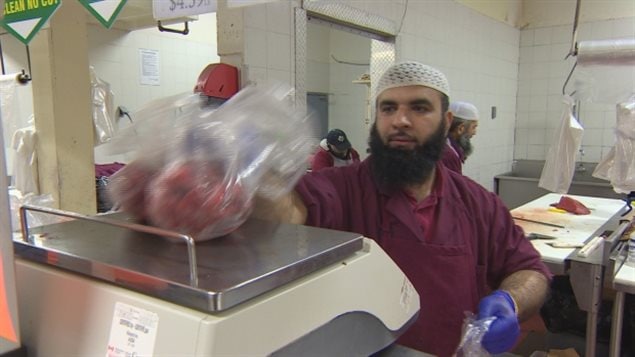Halal labelling of food became a little more transparent in Canada this week. After extensive consultation the Canadian government “amended the ‘Food and Drug Regulations’ to provide consumers with more information about how food labelled as halal are made” according to the Canadian Food Inspection Agency‘s website.
Halal means ‘permissable’ in Arabic

Since April 4th, Halal labels must now include the name of the certifying body to improve transparency for consumers. While this move is an improvement in the Halal indsutry, the need to oversee the certifiers, is the next step.
Sahar Zaidi, of the Canadian Council of Muslim Women, says the CFIA regulation is a good first step. She says the Muslim communities that are quite strict were not always sure if what they were eating was truly ‘halal’. She says, however, “there’s still some ambiguity around who will do the certification, there’s no national body or a national standard to adhear to.”
Certifying organizations are not yet regulated
Muslim Canadians, are a diverse group of a million people in Canada, one of the fastest growing populations in the country.
ListenIt is estimated the halal food business is now worth a $1 billion dollars annually in Canada. For animal products, the halal requirements include blessing each animal before slaughtering it by hand. Hasan Taweel, a butcher who specializes in halal products in Windsor, Ontario, said this is an important process for many Muslims.
“It’s a big issue,” Taweel told CBC News. “Eating meat, being cheated, buying fake meat that is not halal … it’s a big issue.” He believes customers are regularly cheated, since it is very difficult to tell if the animal has undergone the ritual slaughter when making a purchase at the butcher shop. Like many others, he wants to see the regulations go even further to establish what groups are allowed to certify the food.
Currently in Canada there are over a dozen organizations that certify that a product conforms to halal requirements. The Islamic Food and Nutrition Council of Canada, is one of the biggest. It’s based in Mississauga, Ontario. west of Toronto.
Sahar Zaidi says it now up to Muslims to establish another regulator. “The onus is upon the Muslim community to come together and say OK well have this and now if we create a national standard, and we create one halal certification across the board it would make everyone’s lives a lot easier.”







For reasons beyond our control, and for an undetermined period of time, our comment section is now closed. However, our social networks remain open to your contributions.